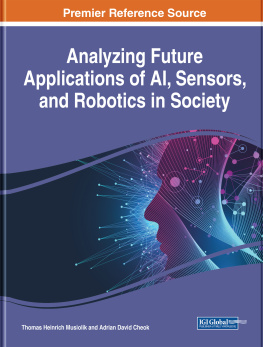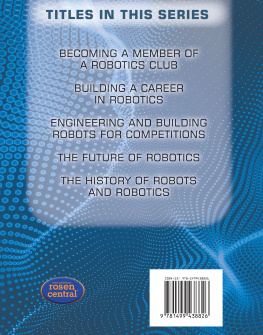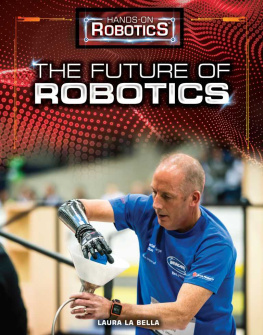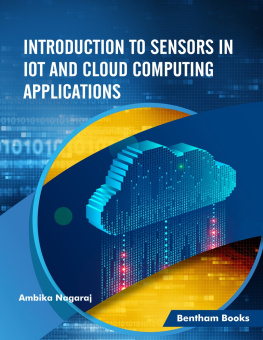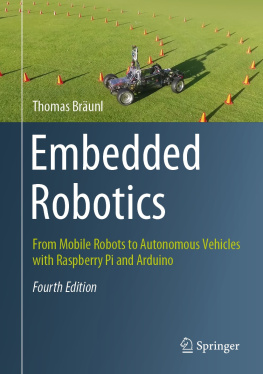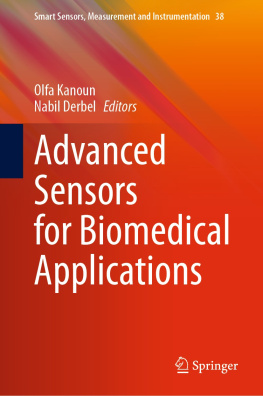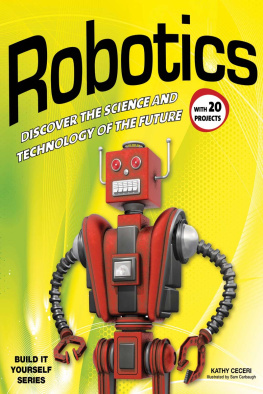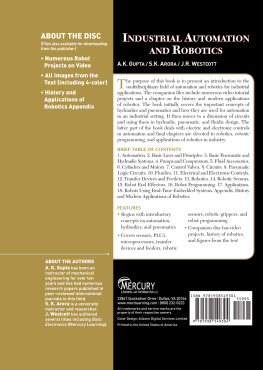Analyzing Future Applications of AI, Sensors, and Robotics in Society
- Thomas Heinrich Musiolik
Berlin University of the Arts, Germany - Adrian David Cheok
iUniversity, Tokyo, Japan
A volume in the Advances in Computational Intelligence and Robotics (ACIR) Book Series Book Series
Published in the United States of America by IGI Global (an imprint of IGI Global) 701 E. Chocolate Avenue Hershey PA 17033 Tel: 717-533-8845 Fax: 717-533-8661 E-mail: cust@igi-global.com Web site: http://www.igi-global.com/reference
Copyright 2021 by IGI Global. All rights reserved. No part of this publication may be reproduced, stored or distributed in any form or by any means, electronic or mechanical, including photocopying, without written permission from the publisher.
Product or company names used in this set are for identification purposes only. Inclusion of the names of the products or companies does not indicate a claim of ownership by IGI Global of the trademark or registered trademark.
Library of Congress Cataloging-in-Publication Data
Names: Musiolik, Thomas Heinrich, 1980- editor. | Cheok, Adrian David,
editor.
Title: Analyzing future applications of AI, sensors, and robotics in
society / Thomas Heinrich Musiolik and Adrian David Cheok, editors.
Description: Hershey, PA : Engineering Science Reference, 2020. | Includes
bibliographical references and index. | Summary: "This book explores the
future challenges and hidden potentials of the application of artificial
intelligence, sensors, and robotics in society"-- Provided by publisher.
Identifiers: LCCN 2019054293 (print) | LCCN 2019054294 (ebook) | ISBN
9781799834991 (h/c) | ISBN 9781799835004 (s/c) | ISBN 9781799835011
(eISBN)
Subjects: LCSH: Artificial intelligence. | Detectors. | Robotics.
Classification: LCC Q335 .A48 2020 (print) | LCC Q335 (ebook) | DDC
006.3--dc23
LC record available at https://lccn.loc.gov/2019054293
LC ebook record available at https://lccn.loc.gov/2019054294
This book is published under the IGI Global book series Advances in Computational Intelligence and Robotics (ACIR) (ISSN: 2327-0411 eISSN: 2327-042X)
British Cataloguing in Publication Data
A Cataloguing in Publication record for this book is available from the British Library.
All work contributed to this book is new, previously-unpublished material. The views expressed in this book are those of the authors, but not necessarily of the publisher.
 | Advances in Computational Intelligence and Robotics (ACIR) Book Series Ivan Giannoccaro (University of Salento, Italy) ISSN: 2327-0411 |
Mission
While intelligence is traditionally a term applied to humans and human cognition, technology has progressed in such a way to allow for the development of intelligent systems able to simulate many human traits. With this new era of simulated and artificial intelligence, much research is needed in order to continue to advance the field and also to evaluate the ethical and societal concerns of the existence of artificial life and machine learning.
The Advances in Computational Intelligence and Robotics (ACIR) Book Series encourages scholarly discourse on all topics pertaining to evolutionary computing, artificial life, computational intelligence, machine learning, and robotics. ACIR presents the latest research being conducted on diverse topics in intelligence technologies with the goal of advancing knowledge and applications in this rapidly evolving field.
Coverage - Pattern Recognition
- Robotics
- Adaptive and Complex Systems
- Natural Language Processing
- Computational Intelligence
- Synthetic Emotions
- Computer Vision
- Artificial Life
- Automated Reasoning
- Brain Simulation
| IGI Global is currently accepting manuscripts for publications within this series. To submit a proposal for a volume in this series please contact our Acquisition Editors at . |
The Advances in Computational Intelligence and Robotics (ACIR) Book Series(ISSN 2327-0411) is published by IGI Global, 701 E. Chocolate Avenue, Hershey, PA 17033-1240, USA, www.igi-global.com. This series is composed of titlesavailable for purchase individually; each title is edited to be contextually exclusive from any other title within the series. For pricing and ordering information please visit http://www.igi-global.com/book-series/advances-computational-intelligence-robotics/73674. Postmaster: send all address changes to above address. Copyright 2021 IGI Global. All rights, including translation in other languages reserved by the pulisher. No part of this series may be reproduced or used in any form or by any means - graphics, electronic, or mechanical, including photocopying, recoreding, taping, or information and retrieval systems - without written permission from the publisher, except for non commercial, educational use, including classroom teaching purposes. The views expressed in this series are those of the authors, but not necessarily of IGI Global
Titles in this Series
Intelligent Computations Applications for Solving Complex Problems
Naveen Dahiya (Maharaja Surajmal Institute of Technology, New Delhi, India) Zhongyu Lu (University of Huddersfield, UK) Vishal Bhatnagar (Ambedkar Institute of Advance Communication Technologies & Research, India) and Pardeep Sangwan (Maharaja Surajmal Institute of Technology, New Delhi, India)
Engineering Science Reference copyright 2021 300pp H/C (ISBN: 9781799847939) US $225.00 (our price)
Artificial Intelligence and the Journey to Software 2.0 Emerging Research and Opportunities
Divanshi Priyadarshni Wangoo (Indira Gandhi Delhi Technical University for Women, India)
Engineering Science Reference copyright 2021 150pp H/C (ISBN: 9781799843276) US $165.00 (our price)
Practical Applications and Use Cases of Computer Vision and Recognition Systems
Chiranji Lal Chowdhary (Vellore Institute of Technology, India) and B.D. Parameshachari (GSSS Institute of Engineering and Technology for Women, India)
Engineering Science Reference copyright 2020 300pp H/C (ISBN: 9781799849247) US $195.00 (our price)
Machine Learning Applications in Non-Conventional Machining Processes
Goutam Kumar Bose (Haldia Institute of Technology, Haldia, India) and Pritam Pain (Haldia Institute of Technology, India)
Engineering Science Reference copyright 2020 300pp H/C (ISBN: 9781799836247) US $195.00 (our price)
Handbook of Research on Smart Technology Models for Business and Industry
J. Joshua Thomas (UOW Malaysia KDU Penang University College, Malaysia) Ugo Fiore (University of Naples Parthenope, Italy) Gilberto Perez Lechuga (Autonomous University of Hidalgo State, Mexico) Valeriy Kharchenko (Federal Agroengineering Centre VIM , Russia) and Pandian Vasant (University of Technology Petronas, Malaysia)
Engineering Science Reference copyright 2020 491pp H/C (ISBN: 9781799836452) US $295.00 (our price)

